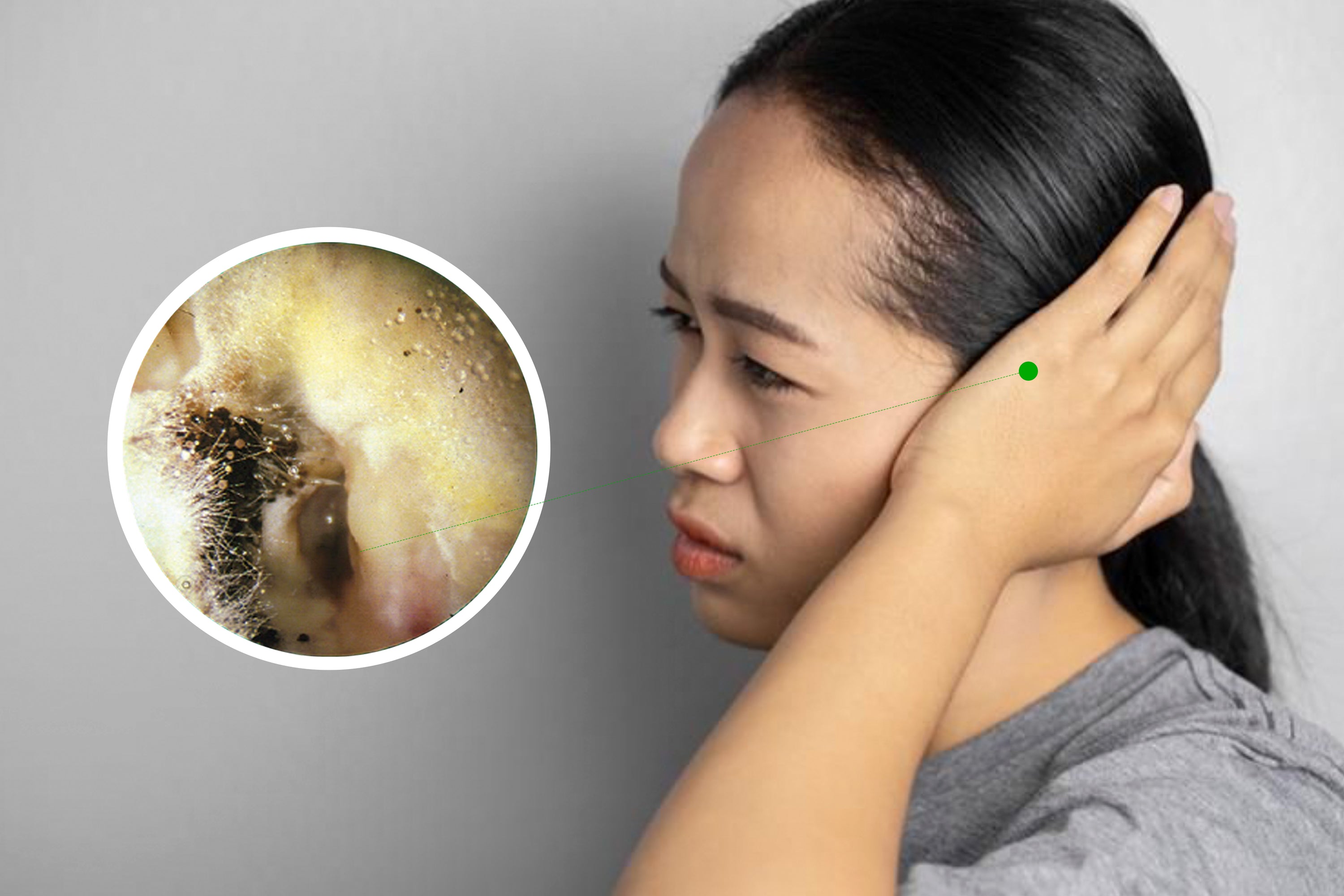Fungal ear infections, also known as otomycosis or fungal otitis externa, are relatively common conditions affecting the external ear canal. Unlike bacterial infections, which are more prevalent, fungal ear infections are caused by various fungi, primarily the Aspergillus species and Candida albicans. These infections can be bothersome and uncomfortable but are generally not considered serious. Understanding the causes, symptoms, and treatment options is essential for managing fungal ear infections effectively.
Is Ear Fungal Infection Harmful?
Initially, ear fungal infection is merely an irritation causing discomfort. If over-the-counter antifungal cream proves ineffective, prompt medical attention is essential. Neglecting treatment can result in hearing loss, eardrum perforation, and temporal bone infection — the part of the skull encompassing the middle and inner ear.
People suffering from low immunity, diabetes, or eczema should take special care and visit a doctor. These individuals are at a higher risk, and early intervention is crucial to prevent complications. Understanding the potential dangers of untreated ear fungus underscores the importance of seeking timely medical advice for effective management and prevention of severe consequences.
Can I Lose My Hearing After Fungal Ear Infections?
Fungal ear infections can be painful, and you might experience slight, temporary hearing loss due to fluid in the ear passages. Mild, short-term hearing loss is common and usually improves as the infection clears. However, severe infections may lead to lasting damage to inner ear structures, resulting in permanent hearing degradation. If experiencing an allergic reaction, maintain ear dryness, cleanliness, and remove excess wax, earplugs, earrings, and hearing aids until the reaction subsides.
Can I Wear Hearing Aids While Having Fungal Ear Infections?
Wearing hearing aids during a fungal ear infection is generally not recommended. Fungal infections can thrive in warm and moist environments, and hearing aids create an environment conducive to fungal growth. It's crucial to prioritize the treatment of the fungal infection and allow the ear to heal before resuming the use of hearing aids.
Symptoms of Fungal Ear Infections
Recognizing the symptoms of fungal ear infections is crucial for seeking prompt medical attention. Common signs and symptoms include:
- Discharge: Fungal infections can lead to the production of a yellowish or greenish discharge from the ear. The discharge may have a foul odor.
- Itching: Persistent itching inside the ear canal is a common early symptom of fungal ear infections. It may be accompanied by a sense of discomfort.
- Hearing Loss: In some cases, hearing loss may occur due to the swelling and blockage caused by the infection.
- Pain: As the infection progresses, pain in the ear may develop. The pain can range from mild to severe and may be exacerbated by movement of the jaw.
- Redness and Swelling:The skin of the external ear canal may become red and swollen, indicating an inflammatory response to the infection.
Causes of Fungal Ear Infection
Fungal ear infections typically occur when there is an overgrowth of fungi in the external ear canal. Several factors can contribute to the development of these infections:
- Moisture and Warmth: Fungi thrive in warm and moist environments. Prolonged exposure to water, such as during swimming or humid weather, can create an ideal breeding ground for fungi in the ear canal.
- Injuries or Abrasions: Scratches, cuts, or injuries to the ear canal can provide an entry point for fungi. Damaged skin is more susceptible to fungal infections.
- Impaired Immune System: Individuals with weakened immune systems, whether due to medical conditions or medications, are more vulnerable to fungal infections, including those in the ear.
- Use of Antibiotics or Steroids: Prolonged use of antibiotics or steroid ear drops can disrupt the natural balance of microorganisms in the ear, making it easier for fungi to proliferate.
Risk Factors for Fungal Ear Infections
- Diabetes: People with diabetes may experience changes in the skin, making it more susceptible to infections, including fungal ear infections.
- Dry Ear with No Earwax Protection: Earwax plays a protective role by trapping debris and preventing infections. A lack of earwax or overly dry ears may increase vulnerability to fungal growth.
- Eczema: Individuals with eczema, a skin condition characterized by inflammation and itching, may have compromised skin barriers, making them more prone to fungal infections.
- Living in Warm Tropical Climates: The warm and humid conditions in tropical climates provide an ideal environment for fungal growth, increasing the risk of otomycosis.
- Low Immunity: Individuals with weakened immune systems, whether due to underlying medical conditions or medications, are at an increased risk of fungal infections.
- Open Wounds in the Ear: Having an open wound in the ear, whether from trauma or injury, provides a direct entry point for fungi.
- Swimming in Contaminated Water: Exposure to contaminated water, such as in ponds or pools with inadequate hygiene, can introduce fungi into the ear canal.
- Use of Steroids and Antibiotics: Excessive use of antibiotic ear drops can alter the pH level of the ear, creating an environment conducive to fungal growth. pH, or potential of hydrogen, is a measure of how acidic or non-acidic a surface is.
Treating Fungal Ear Infections
Treatment for fungal ear infections typically involves antifungal medications and addressing underlying contributing factors. Here are common approaches:
- Addressing Contributing Factors: Identifying and addressing factors contributing to the infection, such as excessive moisture, is essential for preventing recurrence. Patients may be advised to keep the ears dry and avoid activities that introduce water into the ear canal.
- Cleaning Your Ears: Gentle cleaning of the ear canal may be necessary to remove debris and discharge. However, it is crucial to avoid inserting objects into the ear canal, as this can exacerbate the condition. It is recommended that you visit a healthcare professional to have this ear cleaning done for you.
- Using Antifungal Ear Drops: Topical antifungal medications, such as clotrimazole or miconazole, are often prescribed to treat fungal ear infections. These medications help eliminate the fungi causing the infection.
- Using Systemic Antifungal Medications: In severe or recurrent cases, oral antifungal medications may be prescribed to address the infection from within the body.
Preventing Fungal Ear Infection
Prevention is key to avoiding fungal ear infections. Consider the following preventive measures:
- Avoiding Inserting Foreign Objects: Refrain from inserting cotton swabs, bobby pins, or any objects into the ear canal. This can damage the delicate skin and push debris further inside.
- Manage Allergies: Addressing allergies promptly can help prevent inflammation and irritation in the ear canal, reducing the risk of fungal infections.
- Keeping Ears Dry: After swimming or bathing, ensure that the ears are thoroughly dried. Tilt the head to allow water to drain out, and use a towel to gently dry the ears.
- Limiting Earwax Removal: While it's essential to maintain good ear hygiene, excessive cleaning or removal of earwax can disrupt the natural protective barrier, making the ears more susceptible to infections.
- Wearing Hearing Protection: When swimming, consider using earplugs to prevent water from entering the ear canal. Additionally, wearing a shower cap can help keep the ears dry during bathing.
Fungal ear infections can be uncomfortable and inconvenient, but with prompt diagnosis and appropriate treatment, most cases can be effectively managed. Seeking medical attention when symptoms arise is crucial for accurate diagnosis and tailored treatment plans. Additionally, adopting preventive measures, especially for individuals at higher risk, can significantly reduce the likelihood of recurrence, promoting ear health and overall well-being. If you suspect a fungal ear infection or experience persistent ear symptoms, consult with a healthcare professional for proper evaluation and guidance.





